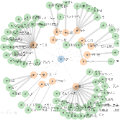Conversational recommender systems (CRSs) often utilize external knowledge graphs (KGs) to introduce rich semantic information and recommend relevant items through natural language dialogues. However, original KGs employed in existing CRSs are often incomplete and sparse, which limits the reasoning capability in recommendation. Moreover, only few of existing studies exploit the dialogue context to dynamically refine knowledge from KGs for better recommendation. To address the above issues, we propose the Variational Reasoning over Incomplete KGs Conversational Recommender (VRICR). Our key idea is to incorporate the large dialogue corpus naturally accompanied with CRSs to enhance the incomplete KGs; and perform dynamic knowledge reasoning conditioned on the dialogue context. Specifically, we denote the dialogue-specific subgraphs of KGs as latent variables with categorical priors for adaptive knowledge graphs refactor. We propose a variational Bayesian method to approximate posterior distributions over dialogue-specific subgraphs, which not only leverages the dialogue corpus for restructuring missing entity relations but also dynamically selects knowledge based on the dialogue context. Finally, we infuse the dialogue-specific subgraphs to decode the recommendation and responses. We conduct experiments on two benchmark CRSs datasets. Experimental results confirm the effectiveness of our proposed method.
翻译:比较建议系统(CRSs)经常利用外部知识图表(KGs)引入丰富的语义信息,并通过自然语言对话推荐相关项目。然而,现有CRS中使用的原始KGs往往不完整和稀少,这限制了建议中的推理能力。此外,只有极少数现有研究利用对话环境动态地完善来自KGs的知识以提出更好的建议。为了解决上述问题,我们提议了“不完全KGs对话建议(VRICR)的变异性理由” 。我们的主要想法是纳入与CRSs自然相伴的大型对话系统,以加强不完整的KGs;以及以对话环境为条件进行动态的知识推理。具体地说,我们将KGs的对话特定子集作为潜在的变量,在适应性知识图形反构图重组前绝对地加以完善。我们提议了一种变式的巴伊斯法方法,在对话特定子集中不仅利用对话机制来调整缺失的实体关系,而且还在对话背景下动态地选择知识。我们用实验方法对两个对话背景进行测试。我们用实验方法来测定了我们的拟议结果。




